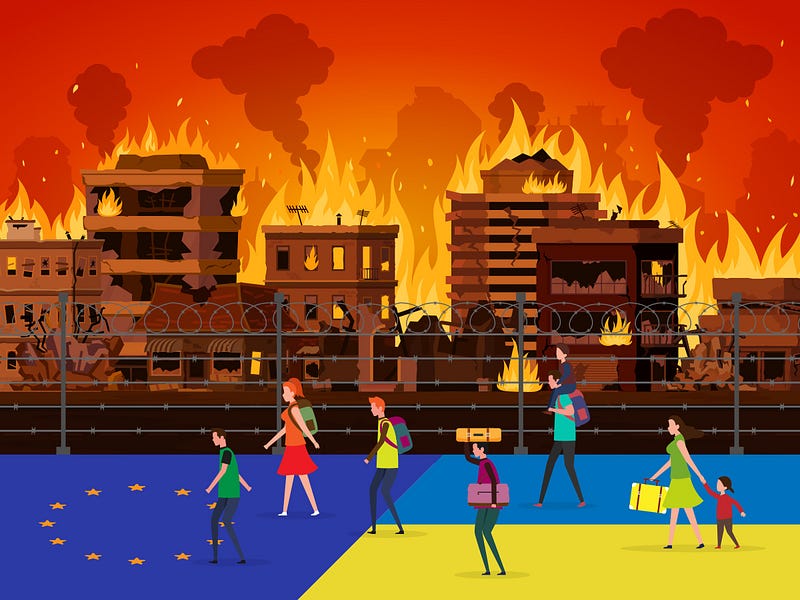
Given that Russia is preparing for a new wave of mobilization and missile strikes against Ukraine are continuing, it seems that there is enough potential left in Russia to continue the war against Ukraine in the long term. This means that what is going on in Ukraine, is likely to be a protracted conflict, i.e. the war is unlikely to be finished by Russia in 2023, as a result of which, there may be a serious shortage of military personnel in Ukraine, on the one hand, and a new wave of Ukrainian refugees is likely to appear in Europe, on the other. Will Europe be able to cope with this?
While universal conscription in Ukraine already applies to men over 60, and the country is likely to soon face a shortage of soldiers, the number of potentially liable to military service persons in Russia is about 30 million, adding, that according to this scenario, men over 60 will also be called in. The estimated number of casualties and wounded is about 100,000, on all sides. As a direct consequence of the war in Ukraine, an estimated 8 million Ukrainian refugees may currently stay in the EU, and this figure may be doubled by the end of 2023.
Statistics can be cited endlessly, but no figures or surveys can reveal the real portrait of people who left their war-torn homeland and came to Europe. These Ukrainian citizens represent a very rare caste — the caste of European war refugees. Some European countries have already gained similar experiences several decades ago when during the war in former Yugoslavia tens of thousands of people left their homes and came to Austria, Germany and Hungary, seeking for safety and care, but only for a short period of time. Despite the known acts of brutality and barbarism, the conflict in the Balkans in the 1990s was limited (both in time and territory), and after peace negotiations most of the refugees returned home.
I have already heard so much rubbish about Ukrainian refugees..! I would like to dispel some myths about them, concerning who they are, what language they speak and what their general mood may be. It is important to clarify this in order to better understand them. This is in our interests not only in the short term, but it is also simply inevitable in the long term, given that the majority of these people intend to stay in Europe. Ultimately, Europe is responsible for taking care for them, what fact, I am afraid, is not entirely known to the so-called ’indigenous’ Europeans.
As a starting point, it should be take into account that most people left Ukraine in order to avoid aggression and repression, sexual violence or simply not to freeze. Some wanted to avoid conscription. As for the age of the refugees, mostly adult women and their minors arrived in Europe, but of course, quite a good few of the refugees are 30–40 year-old males. When it comes to the integration of such a mass of people, great attention should be payed to the issue of the potential success of the integration process. Since the largest segment of refugees is people aged 30–40, it is assumed that they will be able to successfully integrate.
Unfortunately, not too many of them speak foreign languages. As for the language skills of the Ukrainian refugees, it should be indicated, however strange it is, that the vast majority of Ukrainian refugees fluent only in Russian. Ukrainian and English languages come only after Russian.
In addition to the language skills of Ukrainian refugees, what else should Europe know about them? They are from all social groups, not only from the so-called elite. Most of them do not have a regular, stable income, so they should be provided a full access to social support programs, and also to various assistance provided by NGOs, not to mention that the physical and mental health problems of war refugees also need to be resolved. All this lays a huge burden on national budgets.
I do not want to simplify things too much but I must say, I am not sure that Europeans realize what consequences European states will soon have to face. I mean the two major challenges mentioned above, namely economic and moral consequences (in other words, responsibilities).
Let’s put aside the enormous amount of money the EU supports Ukraine with, including billions of euros to ensure the administrative functioning of the state in wartime, as well as to restore Ukraine in the future. I also do not want to go into details about the gigantic financial cost of arms supplies and humanitarian aid programs provided by Europe. What I am referring to, is in addition to all the mentioned expenses.
As for national budgets, feeding Ukrainian refugees is unlikely to cause problems. The issue of employment can already be problematic; moreover, the treatment of Ukrainian refugees who have experienced the psychological trauma of the war is a certain issue that can cause further serious problems in European societies. Those who fled to Europe from Ukraine will never forget their war experience during their lifetime.
This means, that they carry, and without professional help, they continue to carry a trauma inside, what can create a toxic atmosphere in happy European societies. Impoverished and traumatized refugees and, prosperous and satisfied locals are, in my opinion, not an ideal combination, I guess. It should also be added that Ukrainian war refugees will probably never stop hating Russia and Russians which can create even more tensions in Europe. As already be mentioned, I am not entirely sure that European citizens are aware of the abovementioned options and responsibilities. Nevertheless, they should be well informed and know all this, because Europe is our common concern, and everything that happens there, affects us personally. This is our life, our society, our costs. We all are responsible for the future of Europe.
Leave a Reply